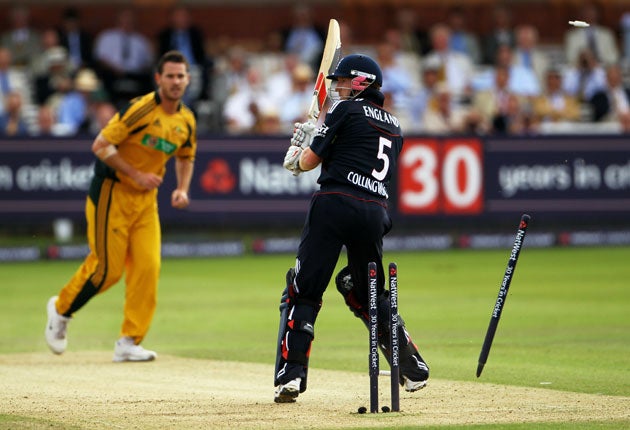England left with plenty to ponder after Tait fires out rapid Ashes warning
Australia 277-7 England 235

One of the troubles with one-day cricket is the pace with which it is possible to travel from hero to zero. Early last week, England were on a mountain top, looking down on Australia who were clambering about messily below trying to find a foothole.
By the conclusion of the NatWest Series on Saturday evening, if the positions had not exactly been reversed, the tourists had given an extremely sharp tug on the rope. In winning the last two matches of five, in some style, they demonstrated that their force is not as spent as some had supposed and that England were not yet as imposing as many others had suggested.
England's journey from domination to clinging on was hastened in every sense because Australia found a cutting edge. His name was Shaun Tait (though it might well have been, too, the injured Mitchell Johnson lest anyone forget).
Brought into the squad unexpectedly as an unlike-for-unlike replacement for the off-spinner Nathan Hauritz, he made an immediate difference. Quick and probing in the first two matches in which he appeared, on Saturday at Lord's he produced one of the most rapid bursts of bowling to be seen in England – or anywhere. The talk already is that Australia must persuade him to change his mind about sitting out of Test cricket before the Ashes, which begin in November.
If debates can be had about whether he really reached 100mph with the fifth delivery of his first over – as the television speed gun indicated – nobody could argue that he was other than frighteningly fast in all of his 8.3 overs. It was genuinely electrifying stuff and it disrupted England.
The first four overs from the Pavilion End were high theatre. England's captain, Andrew Strauss, seeking merely to push forward, had his defences breached and was probably wise not to look round to see the off stump careering backwards at least 15 yards in a series of perfectly composed somersaults.
Two balls later, Mike Yardy, promoted to number three in the order because of an injury to Kevin Pietersen, was left utterly perplexed. There is an argument to be had about whether Yardy – who had never batted in the top three for England, although batting is his bread and butter at Sussex – should have been there. There was no argument, however, about the 96.7mph missile that he chose to leave, before it crashed into his stumps.
But if those incisions more or less confirmed it would again be Australia's tie, they did not expose the only shortcomings in England's cricket. Australia won by 42 runs when, for much of the first part of a lovely Lord's day, their batsmen appeared to have not bothered to turn up at all.
After 30 overs of their innings, having chosen to bat, Australia were 107 for four. Four things altered the course of their innings. The first was the change of ball, the second was the batting powerplay and the third and fourth were how the sides used that powerplay differently. Mike Hussey and Shaun Marsh were bold and decisive in every shot they played, while England's bowling seemed to follow a set course.
Neither Yardy, who is in the side largely because of his left-arm dart bowling, nor Graeme Swann, the best spin bowler in the world at present, were allowed to finish their full allocation of overs. Yet they had both been economical, they had provided different problems. Maybe Hussey and Marsh would have meted out similar disrespectful treatment. Maybe not.
There was enough to continue to offer hope for England's chances in the World Cup next year. The old battler, Paul Collingwood, stuck out his chin and made 95 from 121 balls. For a while, the sixth- and seventh-wicket partnerships between Collingwood and Luke Wright and Tim Bresnan respectively suggested England might overcome the Tait blitz and chase down the target. That they did not was probably as well in ensuring they concentrate on weaknesses.
Throughout the series, England failed to make enough runs at the top of the order, with Craig Kieswetter and Pietersen both having disappointing returns. Kieswetter, out of form, probably needs the consolation of cheap runs in the three matches against Bangladesh. Pietersen will not have the chance, the thigh strain he sustained in the field on Saturday forced him to bat with a runner and will also cause him to miss a meaningless trio of upcoming matches.
The squad was named yesterday. Jonathan Trott comes in for Pietersen and will be the spare batsman with Ian Bell going in at three. Ajmal Shahzad has been preferred ahead of Ryan Sidebottom and Graeme Swann has been given a well-earned, much-needed rest to allow James Tredwell to have a bash.
England should win all three matches – the first at Trent Bridge on Thursday – against a Bangladesh side which has sadly lost its way.
Of considerably more interest to the average fan should be what Australia are doing next. Far from going home, they are staying in this country to play in a series of matches against Pakistan, two Twenty20 games at Edgbaston tomorrow and Wednesday and two Test matches – at Lord's next week and Headingley the one after.
Subscribe to Independent Premium to bookmark this article
Want to bookmark your favourite articles and stories to read or reference later? Start your Independent Premium subscription today.

Join our commenting forum
Join thought-provoking conversations, follow other Independent readers and see their replies